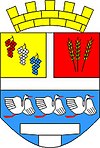Vinkovci
|
Vinkovci Grad Vinkovci |
||
|---|---|---|
| City | ||

Vinkovci city center
|
||
|
||
| Location of Vinkovci in Croatia | ||
| Coordinates: 45°17′28″N 018°48′04″E / 45.29111°N 18.80111°ECoordinates: 45°17′28″N 018°48′04″E / 45.29111°N 18.80111°E | ||
| Country |
|
|
| Region | Slavonia | |
| County |
|
|
| Government | ||
| • Type | City | |
| • Mayor | Mladen Karlić (HDZ) | |
| Area | ||
| • City | 94.21 km2 (36.37 sq mi) | |
| Elevation | 90 m (300 ft) | |
| Population (2011) | ||
| • City | 35,312 | |
| • Density | 370/km2 (970/sq mi) | |
| • Urban | 32,029 | |
| Time zone | CET (UTC+1) | |
| • Summer (DST) | CEST (UTC+2) | |
| Postal code | 32100 | |
| Area code(s) | 32 | |
| Vehicle registration | VK | |
| Website | vinkovci.hr | |
Vinkovci (pronounced [ʋîːŋkoːʋtsi]) is a city in Slavonia, in the Vukovar-Srijem County in eastern Croatia. In the 2011 census, the total population of the city was 35,312, making it the largest town of the county. Surrounded by many large villages, it is a local transport hub, particularly because of its railways.
The area around Vinkovci (German: Winkowitz, Hungarian: Vinkovce, Latin: Colonia Aurelia Cibalae) has been continually inhabited since the Neolithic period, well before the Roman period. The Romans named the town Colonia Aurelia Cibalae, most likely during the reign of emperor Caracalla. It was the birthplace of Roman emperors Valentinian I and Valens. The Roman thermal bath is still preserved underground, along with several other Roman buildings located near the center of today's Vinkovci. The 4th century Battle of Cibalae, between the armies of Constantine I and Licinius, was fought nearby.
From 1526 to 1687 it was part of the Ottoman Empire, administratively located in Sirem sanjak (whose seat was in Dimitrofça) within the Budin Eyalet. It was captured by the Habsburg Empire in 1687, which was later confirmed by the Treaty of Karlowitz in 1699. Until 1918, Vinkovci (named Winkowcze before 1850) was part of the Austrian monarchy (Kingdom of Croatia-Slavonia after the compromise of 1867), in the Slavonian Military Frontier, under the administration of the Brooder Grenz-Infanterie-Regiment N°VII until 1881.
...
Wikipedia


